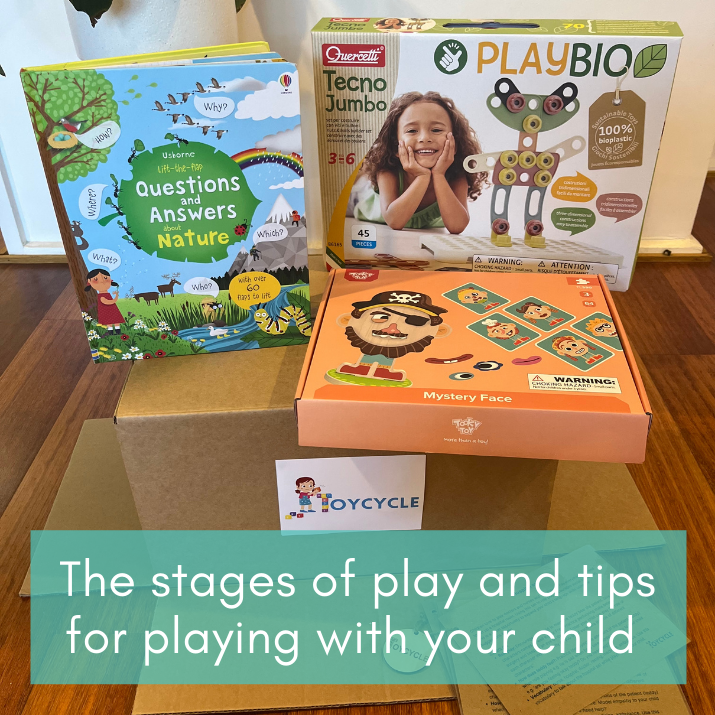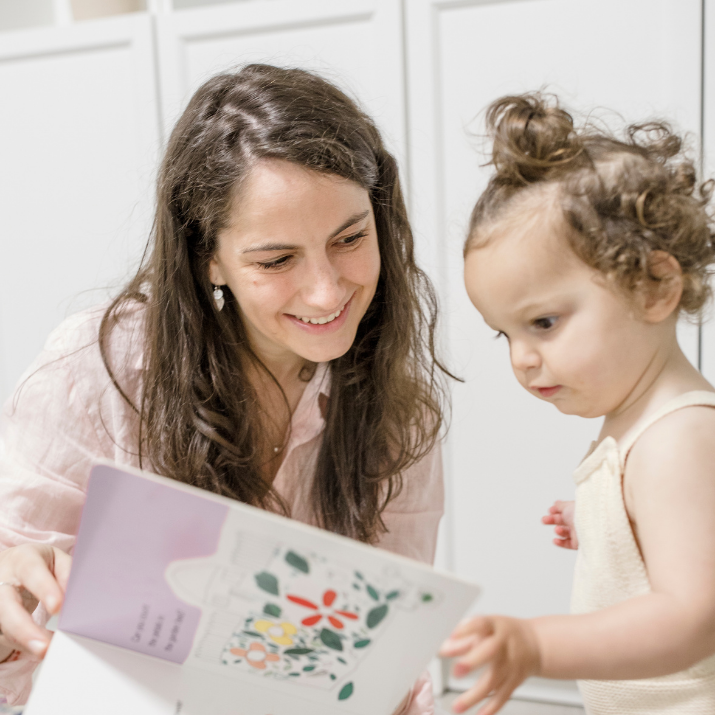
This is a brilliant guest post by Kobie Bloomfield who is a paediatric speech therapist who specialises in childhood language development and most recently founder of the brilliant start-up ToyCycle.
Kobie founded ToyCycle last year, a toy rental delivery service that aims to reduce waste and empower parents to feel more confident when interacting with their children. It is currently available in Melbourne for 3 and 4 year olds. Kobie is currently offering 15 minute free consultations for every new ToyCycle customer. To find out more about ToyCycle head to the website or email Kobie at thetoycyclecompany@gmail.com if you have any questions.
I think this is a fabulous idea and would have loved it when I had little ones. We used our own system of toy rotation with the toys we had as I always felt fewer good quality toys were much better for the kids (and me!) than lots of lesser quality toys. If you live in Melbourne and have a pre-schooler I would highly recommend checking it out.

You are sitting in the living room trying to remember the last time you saw your nice wooden floorboards. Toys are scattered around the room and you are about to clean them up for the 5th time today. Does this sound like a familiar scenario?
The many benefits of play
Children are playful by nature and play impacts the way that they learn and grow, in more ways than we can imagine. During a typical day, a child’s routine is directed by adults, so when they are given an opportunity to play, they are able to make independent decisions without the fear of making mistakes or failing. Even if it looks like your child is ‘mucking around’, they are learning. Play helps to develop:
- Imagination and creativity
- Language skills (understanding and expression)
- Motor skills (fine and gross motor)
- Emotional and behavioural benefits
- Cognitive growth (working memory and self-regulation)
- Greater independence and confidence
The stages of play
Your child’s play will look different depending on their age and stage of development so please do not be alarmed if your 3 year old’s play looks different from their 3.5-year-old cousin’s play. The stages of play that we usually see in children are:
- Solitary play: This typically occurs before the age of 2. Children play on their own and do not notice children playing around them.
- Onlooker play: Children may ask questions but they do not join in the play. They generally just watch their peers play. This occurs at all stages of development.
- Parallel play: Children play alongside each other but independently. They are learning to observe and mimic each other. This encourages sharing and recognising social cues and develops at 2-3 years of age.
- Associative play: When children are interested in the play but not in coordinating or organising it. There are now interactions and the children may ask each other questions. This develops at 3.5-4.5 years of age.
- Cooperative play: Children work together to achieve a common goal. This helps to build communication skills and develops at 4-5 years old.
Tips for playing with your child
There is no set amount of time your child should play each day. The moment you try to ‘schedule’ play, it removes the fun and can become more stressful. Here are some tips I would take into account when playing with your child:
- Allow your child to lead the play as this helps to promote their creativity and encourage independence. I know how tempting it can be to structure their play but hold back if you can. Let your child move at their own pace.
- Build play into routines that you already have in place e.g. bath time. There is no need to schedule extra play time as this removes the fun and can make play more stressful. Instead, try and build play into your everyday interactions and increase the amount of ‘down time’ you have at home.
- Reduce the amount of questions in play. It can be so tempting to ask your child questions, but we can often fall into the trap of becoming a ‘tester’ or ‘entertainer.’ This can put a lot of pressure on your child to constantly have answers. Instead, turn your comments into questions e.g. instead of asking ‘what is that?’ you can say, ‘that is a…duck’ and tell them what it is.
- Having a messy house full of toys can be very stressful. Include a pack away song at the end of play time– cleaning up can be fun too!
- Remove any electronics or screens as they can be a distraction and decrease your child’s concentration. On the occasions where your child wants to engage in screen time, sit with them and talk about what is on the screen as this is a great opportunity for vocabulary development.
- Turn everyday chores into games and play e.g. putting away the dishes or clothes.
- Allow your child to get dirty, feel and explore their surroundings.
- Give your child time to ‘be bored’. When a child isn’t programmed with a specific activity, it gives them an opportunity to get creative and find something that is fun. Whether it is making toothbrush out of a stick or using the pots and pans to build a tower, you’ll be surprised what they come up with!
- Do not limit play to your child’s play room. Bring play into all locations of the house (e.g. the bathroom during bath time).
The importance of toys
As a working mum, there is very limited time in the day to create new learning opportunities for your children. After a long day at work, how are you supposed to find the time to create coloured sand or help your child to make a television out of cardboard, all whilst trying to look after yourself? With the rise of mum entrepreneurs on social media, many everyday mums can feel the pressure to be the ‘perfect mum’ and constantly come up with new play ideas for their children. I am here to let you in on a little secret: toys play a pivotal role in your child’s overall development and there is absolutely no need to put the pressure on yourself to generate your own new ideas.
Toy rotation – less is more
Rotating toys reduces clutter in the house and allows you and your child to focus better without the constant overstimulation. It also teaches your child the importance of recycling and sharing with others and fosters their creativity when they learn to use the same toy in a variety of ways. Dr Metz from the University of Toledo revealed that when there are fewer toys, children play with them in more ways which leads to higher quality play. Finally, it saves money as you don’t have to continuously buy new toys when your children get bored of them.
Having just a few toys on rotation is key, which is why ToyCycle is the perfect service to cater to your child’s learning and development. A 3 or 6 month subscription to ToyCycle provides you with 3 toys per month along with a list of creative ways you can use these toys to interact with your child and develop their language and imagination.
This service is currently available in Melbourne. To find out more, please visit toycycle.com.au or email Kobie at thetoycyclecompany@gmail.com.
